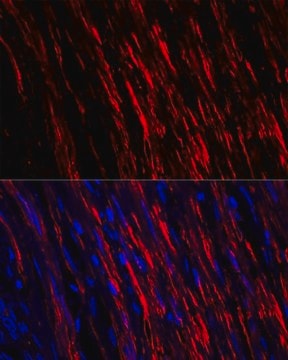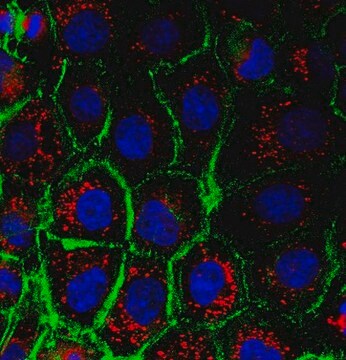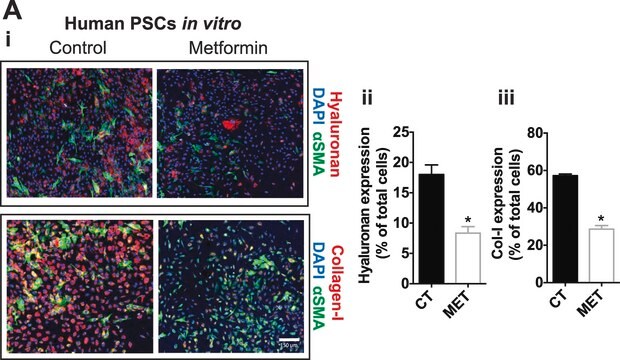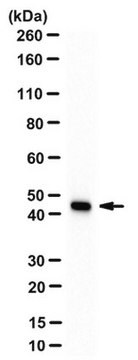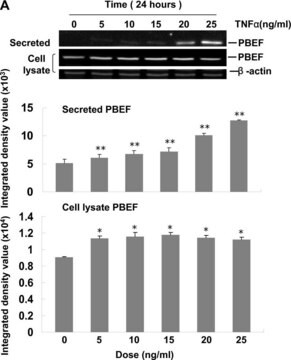MABT823
Anti-alpha-Actin Antibody, Cardiac Muscle Antibody, clone 22D3
clone 22D3, from mouse
Synonym(e):
Actin, alpha cardiac muscle 1, Alpha-cardiac actin
About This Item
Empfohlene Produkte
Biologische Quelle
mouse
Qualitätsniveau
Antikörperform
purified immunoglobulin
Antikörper-Produkttyp
primary antibodies
Klon
22D3, monoclonal
Speziesreaktivität
rat, human, goat, rabbit
Speziesreaktivität (Voraussage durch Homologie)
porcine (based on 100% sequence homology), mouse (based on 100% sequence homology)
Methode(n)
flow cytometry: suitable
immunocytochemistry: suitable
immunofluorescence: suitable
western blot: suitable
Isotyp
IgG1κ
NCBI-Hinterlegungsnummer
UniProt-Hinterlegungsnummer
Versandbedingung
ambient
Posttranslationale Modifikation Target
unmodified
Angaben zum Gen
human ... ACTC1(70)
Allgemeine Beschreibung
Spezifität
Immunogen
Anwendung
Zellstruktur
Immunofluorescence Analysis: A representative lot immunostained cardiomyocytes in human left ventricular endocardial biopsies, rabbit left ventricular myocardium, as well as in goat atrial myocardium frozen tissue sections by fluorescent immunohistochemistry (Driesen, R.B., et al. (2009). J. Cell. Mol. Med. 13(5):896-908).
Western Blotting Analysis: A representative lot specifically detected alpha-cardiac actin in rat myocardium homogenate with no cross-reactivity toward - or -smooth muscle actin in rat aorta and chicken gizzard homogenates, cytoplasmic - or -actin in human platelet lysate, nor -skeletal actin in rat skeletal muscle homogenate (Driesen, R.B., et al. (2009). J. Cell. Mol. Med. 13(5):896-908).
Qualität
Flow Cytometry Analysis: 2 µL of this antibody detected alpha-cardiac actin in one million 4% paraformaldehyde-fixed, 0.2% Triton X-100-permeabilzed HeLa cells.
Zielbeschreibung
Physikalische Form
Lagerung und Haltbarkeit
Sonstige Hinweise
Haftungsausschluss
Sie haben nicht das passende Produkt gefunden?
Probieren Sie unser Produkt-Auswahlhilfe. aus.
Lagerklassenschlüssel
12 - Non Combustible Liquids
WGK
WGK 1
Flammpunkt (°F)
Not applicable
Flammpunkt (°C)
Not applicable
Analysenzertifikate (COA)
Suchen Sie nach Analysenzertifikate (COA), indem Sie die Lot-/Chargennummer des Produkts eingeben. Lot- und Chargennummern sind auf dem Produktetikett hinter den Wörtern ‘Lot’ oder ‘Batch’ (Lot oder Charge) zu finden.
Besitzen Sie dieses Produkt bereits?
In der Dokumentenbibliothek finden Sie die Dokumentation zu den Produkten, die Sie kürzlich erworben haben.
Unser Team von Wissenschaftlern verfügt über Erfahrung in allen Forschungsbereichen einschließlich Life Science, Materialwissenschaften, chemischer Synthese, Chromatographie, Analytik und vielen mehr..
Setzen Sie sich mit dem technischen Dienst in Verbindung.

